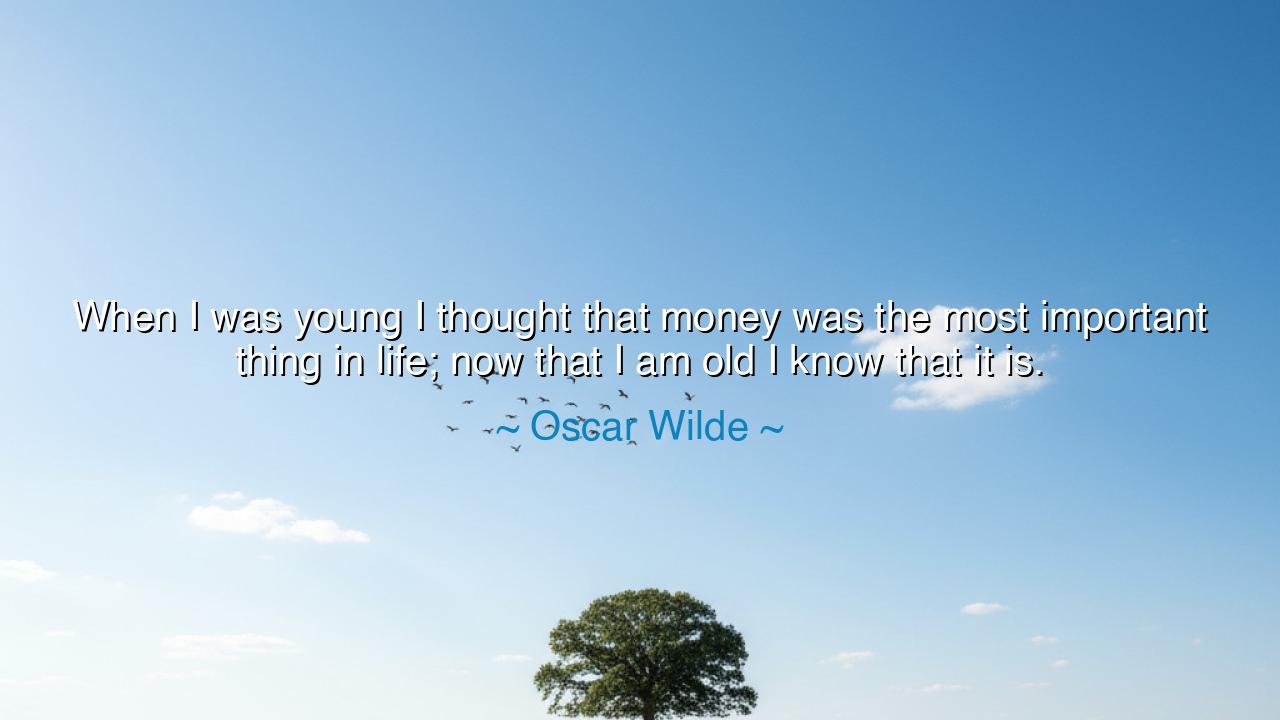
When I was young I thought that money was the most important
When I was young I thought that money was the most important thing in life; now that I am old I know that it is.






The words of Oscar Wilde, “When I was young I thought that money was the most important thing in life; now that I am old I know that it is,” arrive clothed in wit, yet beneath their humor lies a sharp and troubling wisdom. Wilde, master of irony, often spoke truths hidden behind jest, and here he touches upon the paradox of human existence. In youth, we dream that life will be governed by love, art, friendship, and beauty. We laugh at the obsession with wealth, believing ourselves above it. Yet with age, as responsibilities weigh upon us, as needs and debts press close, we awaken to the harsh reality: money is not the highest good, but it has a power that shapes life in ways we cannot ignore.
To understand Wilde’s words, we must see them not as a celebration of greed, but as a lament—an acknowledgment that the world often bows before the coin. For the young, life’s meaning seems boundless, and material things appear secondary. But the old know that money governs food, shelter, health, even dignity. The ideals of youth may remain, but they cannot live in fullness without the means to sustain them. Wilde reveals, with biting irony, that money, though not noble, is often treated as the true foundation of survival.
The ancients spoke of this tension. In the wisdom of Ecclesiastes it is written, “Money answereth all things.” Yet philosophers like Socrates and Epictetus declared that wealth without virtue is bondage. Thus, humanity has always stood between these truths: money cannot give meaning, but its absence can strip away the conditions in which meaning might flourish. Wilde’s statement, half in jest, half in mourning, reminds us that to grow old is to feel the iron weight of necessity pressing upon the lofty wings of idealism.
History bears witness to this reality. Consider the story of Vincent van Gogh, who painted with the fire of genius yet lived in poverty, often dependent on his brother for sustenance. The world now treasures his art as priceless, but in his lifetime he could not sell enough to secure bread. His life reveals the cruelty of a world where even the most radiant soul may falter if deprived of money. Wilde, himself a man who suffered poverty and ruin in his final years, understood that age strips away illusions, leaving only the stark recognition of money’s hold upon existence.
The heart of Wilde’s teaching is not cynicism but awakening. To the young, he warns: do not despise money, for though it is not the highest good, it is a force that cannot be neglected. To the old, he whispers: beware the bitterness of recognizing too late the role it plays. His words remind us that while love, virtue, and beauty are the true treasures of life, money is the vessel in which these treasures must travel. Without it, even the noblest dreams may perish before they have the chance to bloom.
The lesson for us is this: treat money with respect but not with worship. Understand its necessity, but do not mistake it for meaning. Build your life on integrity, love, and purpose, but do not ignore the material foundation that sustains them. Wilde’s irony should not drive us to despair, but to wisdom: to plan carefully, to live prudently, to balance spirit and survival. Let neither poverty enslave you through neglect, nor greed enslave you through obsession.
Practical steps follow. Cultivate a healthy relationship with money: earn it honestly, manage it wisely, and spend it in service of life’s higher purposes. Provide for yourself and those you love, so that necessity does not choke your ideals. Invest not only in wealth but in character, so that if money fails, your soul does not. And always remember: money may sustain the body, but it cannot feed the spirit. Hold both truths together, and you will not be deceived.
Thus Wilde’s words endure, shimmering with irony yet heavy with truth: “When I was young I thought that money was the most important thing in life; now that I am old I know that it is.” Let us receive them not as a call to worship money, but as a sober reminder of its power. Respect it, master it, but never let it master you. For the greatest wealth is not in gold, but in the wisdom to use gold rightly, so that love, art, and virtue may endure.






AAdministratorAdministrator
Welcome, honored guests. Please leave a comment, we will respond soon